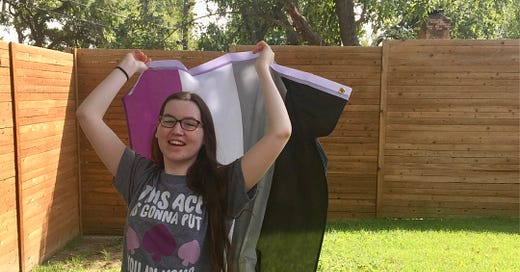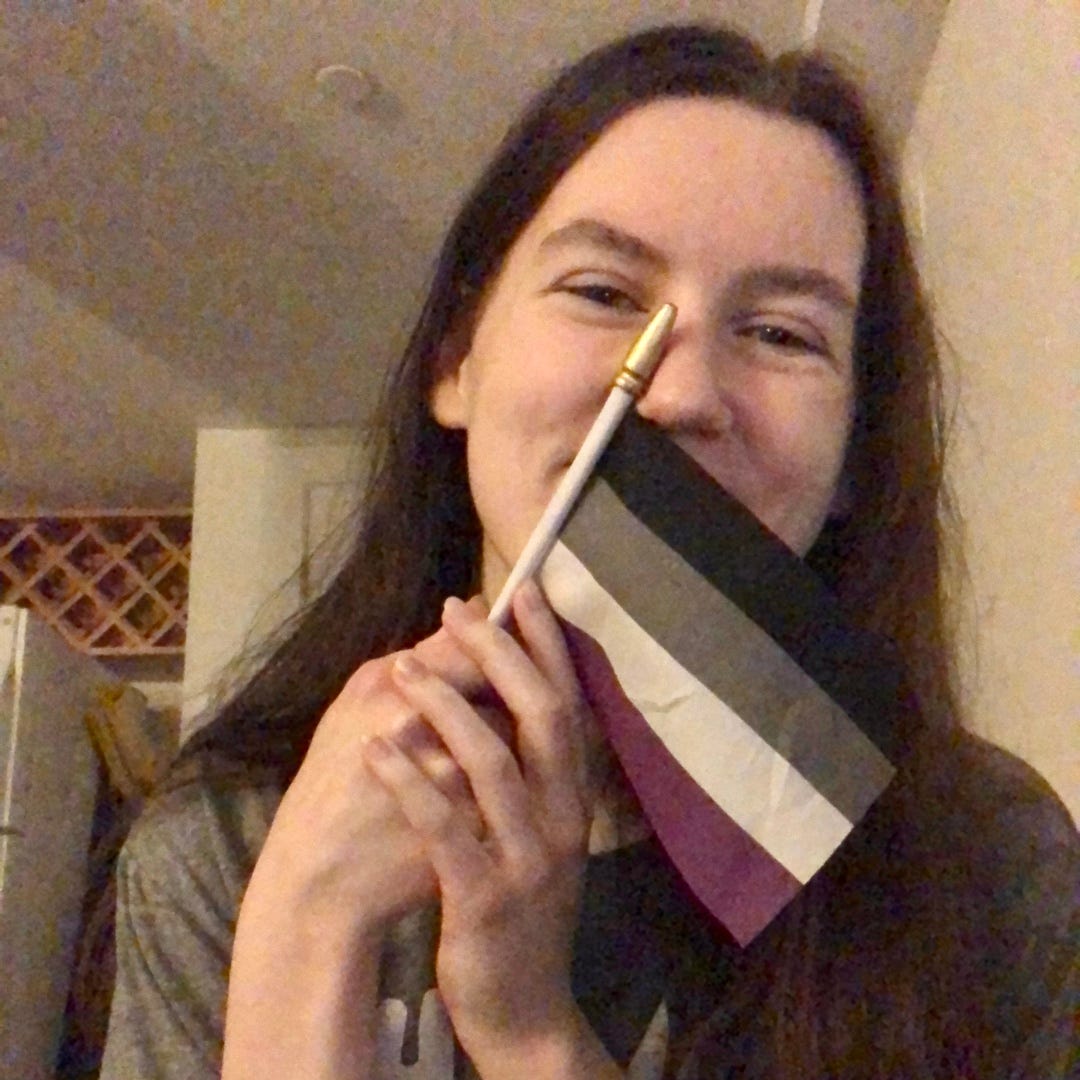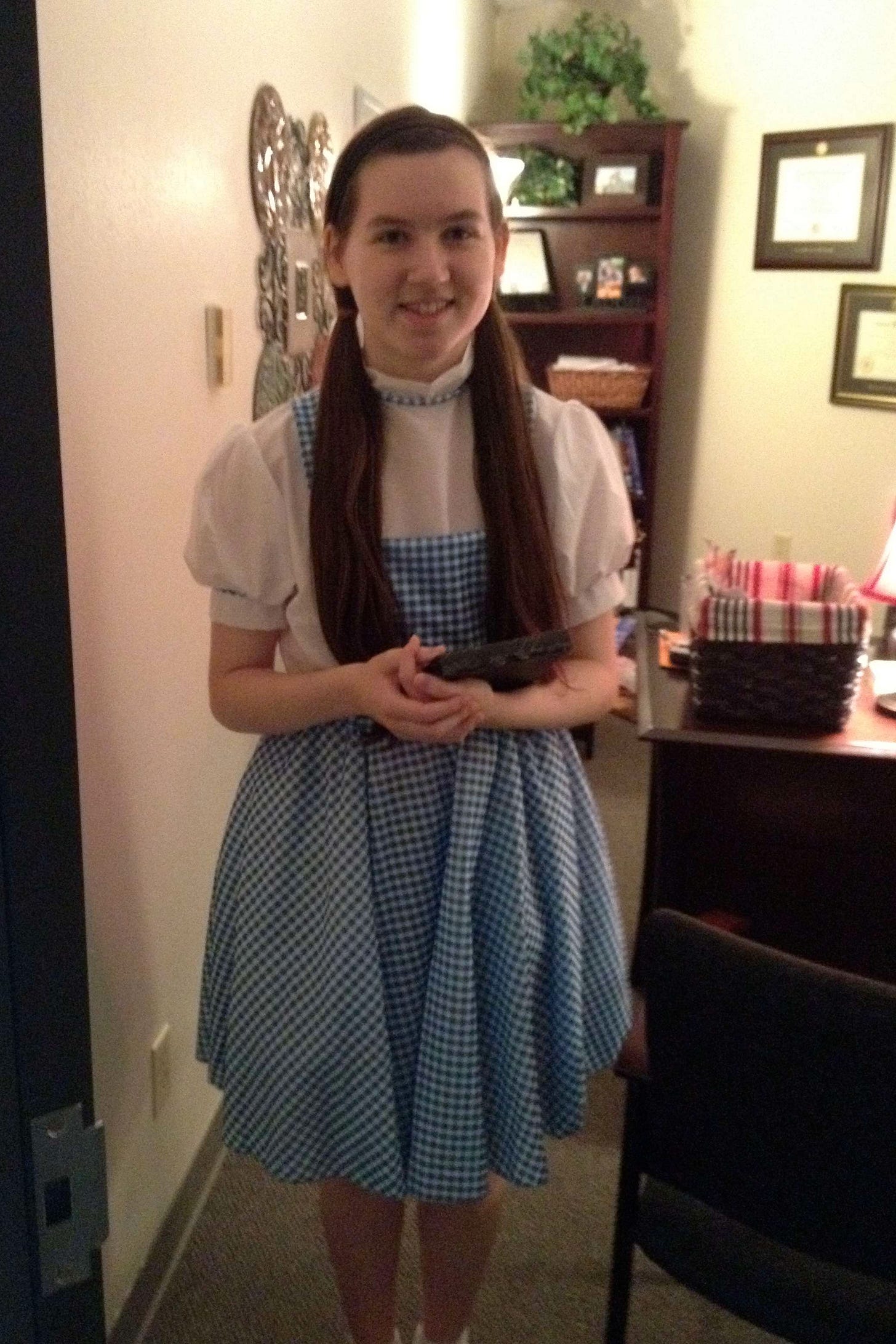My Queerness Just Is: Two Aromantic Asexual & Queerplatonic essays
October 2022 & February 2023 Archive
These short essays where posted on my social media on October 10, 2022 and February 8, 2023, respectively.
I've known I'm aromantic asexual for a long time. For me, coming out has never been a simple, singular event. I've done it dozens of times to different people in different ways and with different identities as I came to understand myself. And while I know I’ll keep doing it for the rest of my life as I meet new people in new places, I’ve finally past the threshold of being fully “out.”
Ever since I realized I was asexual as a high school freshman, I’ve dreamed of the day I could post something on national coming out day. For years, I heard people say it’s okay if you aren’t able to be/come out on national coming out day and how important it is to come out in your own way—on a timeline that fits with your needs. And I listened, but I always knew that someday, I would reach a point when everyone in my life knew.
It started with being out on Tumblr, behind a username not tied to my name. Then telling people in real life. My parents. The one or two church leaders I trusted. My friends: high school ones who I had to “come out” and college ones who I simply introduced myself as aroace to. Then it was talking about being queer and aroace in classes, in activism, in projects, in writing. It was posting little things here and there on my personal social media. It was going all in on TikTok and being out as an openly disabled, queer woman in the workplace. Then, ten years after first realizing my queerness, I came out to my grandparents.
And now, my queerness just is. This is the moment I’ve been waiting for. Nearly a decade and I’m here, posting on national coming out day. Not because this is some big dramatic reveal, but because this is a celebration of my beautiful, nonlinear journey of coming out, growing into my queer identity, and learning not just who I am, but how to be that person.
There is more to learn, more to say, and much more to heal from. But now, I get to do that totally and utterly out loud.
I experienced my first queerplatonic crush at age 13, years before I knew I was autistic or aroace. While all my friends were dating for the first time, I was the 9th wheel calling relationships pointless. I didn’t want the same things as them—Valentine’s Day group dates and zoo first kisses and ship names with their boyfriends.
Truthfully, I didn’t know what I wanted and for a long time, it was okay. I had feelings for someone who made me laugh, challenged me, and created space for me like no one had. I wanted us to be in each other's lives and do it our way. I didn't label the feelings because I didn’t know how, but also because it wasn’t the point. I had a relationship that met my needs and felt like mine, not a prescribed checklist of expectations I didn’t know how to meet.
Until people started shipping us. It would be easy to resent my classmates for pushing romance onto me, but we were kids and no one taught us anything other than romance existed. That doesn’t make it okay to talk behind people's backs or meddle—but we all had growing to do and no one meant to throw my life into a tailspin.
It sounds dramatic, but suddenly, my meaningful friendship with my queerplatonic crush was in a fishbowl; eyes and exceptions at all times. I had to ask—do I like him? Is this romantic? Why have I never thought of it like that?
I didn’t know the answer back then. I maintained I didn’t like him like that for as long as I could, but eventually, it became easier to let people think it was romantic when I knew in my gut it wasn’t.
Our story carried on and that's between us, but when things ended, I was devastated and confused how a friendship could leave me so heartbroken. I wouldn’t understand until four years later at 18 when I realized I was aromantic. I finally basked in the daylight of knowing there was a word for my identity—and for the way I loved.
It was a simple moment, learning what queerplatonic meant and realizing, “oh, that’s what those feelings were.”
Relationships don’t exist in a platonic/romantic binary. There are natural, beautiful feelings and relationships that defy conventions and queer the idea of relationships.
To be in a queerplatonic relationship or to feel queerplatonic attraction isn’t just to fulfill your own needs and desires. It’s to stand in self-loving opposition and paradigm-shifting power. It’s a little revolution made of the perfect blend of agency and interdependence.
The only inherent characteristic of a QPR is that it's defined by those in it. There’re no norms. Think of every relationship activity you can imagine—physical intimacy, commitment, providing support, raising kids, living together, shared finances, marriage. You probably slot the idea of doing or not doing them into romance or friendship. Every relationship is different, yes, but QPRs aren't just tweaking here and there. The whole list becomes a buffet and a potluck with no expectations of hitting all the food groups or making a cohesive meal of foods that “go together.”
I know it might not make sense—I’m not even sure my old queerplatonic crush would understand. But I got over the fear of people not getting it or thinking it was weird a long time ago. Being in a queerplatonic relationship isn’t about making sense to others. It’s about your relationship making sense to you.
Not every aromantic person has queerplatonic attraction and you don’t have to be aromantic to be in a QPR. But for me as an aromantic (and autistic person), queerplatonic love is my way of creating companionship and feeling like myself in a world not built for me.
I haven’t been in a true QPR yet and I don’t know exactly what it'll look like when I do. But I know what the feelings feel like. I let myself dream in the colors of the aroace and queerplatonic flags. I write queerplatonic love stories in my books. I hold my truth close to my chest and out for the world to see not because I need others to understand but because I’m proud. And because I know I’m not alone. If I’d known what queerplatonic meant 10 years ago, the grief and isolation I would’ve been spared is immeasurable. That’s why I share—so someone else can have their simple, freeing moment of “oh, this makes sense.” And to honor that girl years away from hers.
To little Harper in the Dorothy costume: one day you’ll know the transcendent power and beauty of your love. I promise.







